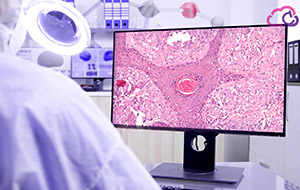CLARIFY Project
New artificial intelligence algorithms are developed to facilitate the diagnosis and treatment of cancerous tumours that are difficult to interpret clinically.
[ 27/11/2023 ]
A team of European researchers and companies, led by the Universitat Politècnica de València (UPV), through the CVBLab-HUMAN-tech group, has developed innovative artificial intelligence algorithms to facilitate the diagnosis and treatment of cancerous tumours that are difficult to interpret clinically. This is one of the main results of the CLARIFY project, which is currently in its final months of execution and focuses specifically on three types of cancer: triple-negative breast cancer (TNBC), high-risk non-muscle invasive bladder cancer (HR-NMIBC) and spitzoid melanocytic lesions (SML).
"In all three cases, the diagnosis is complex and challenging, which we are already addressing with this project. With these algorithms, we are taking another step forward in facilitating the interpretation of histological images and, ultimately, the diagnosis of these types of cancer for medical professionals," says Valery Naranjo, project leader and coordinator of the Computer Vision and Behaviour Analysis Lab (CVBLab) at the UPV's Human-Centered Technology Research Institute (HUMAN-tech).
In addition to these algorithms, the project has already achieved other results of great interest, such as databases of the cancers under study, which can become valuable resources for the medical and scientific community, and advances in the secure management of data in the cloud, with requirements inherent to the health field and with several application scenarios within the project.
Excellence training and European research network
CLARIFY has also carried out a multidisciplinary training programme, which has enabled twelve young researchers of various nationalities to complete their PhD studies at one of the institutions involved in the project, learn about the latest scientific advances in artificial intelligence, cloud computing, and digital pathology and enhance new skills, which will be the key to meeting to the challenges of the engineering-medicine binomial in the coming years.
"And it has driven the launch of a European research network that brings together experts from both fields and helps to improve the exchange of knowledge, always with the same goal: to contribute to facilitating decision-making in the diagnosis and treatment of breast, bladder and skin cancers studied," adds Sandra Morales, researcher at CVBLab-Human-tech of the Universitat Politècnica de València.
Along with the UPV, the project also involves the INCLIVA Health Research Institute, the University of Granada, the University of Amsterdam, the Erasmus MC University Hospital Rotterdam, the University of Stavanger, the University Hospital of Stavanger, and the companies bitYoga and Tyris Software.
Final project meeting in Valencia
The project, funded by the European Union's Horizon 2020 programme under the Innovative Training Networks (ITN), will hold its final conference in just two months at the Universitat Politècnica de València, where all the results of four years of research will be presented. It will be held on 25 and 26 January at the Polytechnic City of Innovation, UPV Science Park, with the aim of facilitating the debate between the research and clinical community and laying the groundwork for future developments and collaborations.
This meeting is open to all scientific and medical communicators interested in the topics addressed by CLARIFY. Registration is free and can be made via the website https://www.clarify-project.eu/final-conference/.
The call for papers is now open.
In addition, 30 November is the deadline for submission of papers related to the topics to be addressed during the conference: artificial intelligence methods applied to histological images, data infrastructure, and cloud-oriented algorithms applied to histological images, computer-aided diagnosis tools from histological images, and content-based image retrieval tools from these images.
Abstracts of previously published high-quality papers are accepted and encouraged, and selected abstracts will be presented in a poster session at the conference.
Outstanding news
 Study a degree at the best technological university in Spain
Study a degree at the best technological university in Spain
The Universitat Politècnica de València is ranked number 1 among Spanish technology universities, according to the Shanghai ranking
 Highly Cited Researchers 2025
Highly Cited Researchers 2025
Avelí Corma, Juan Bisquert and Luis Guanter, the international scientific elite with a Universitat Politècnica de València hallmark
 Historic Milestone in Spanish Higher Education
Historic Milestone in Spanish Higher Education
The UPV inaugurates the Beihang Valencia Polytechnic Institute, the first Spanish university center in China
 Study in English
Study in English
The UPV offers eight degrees, 16 master's and 650 courses in English for the 2025-26 academic year
 A Latin Grammy... with the UPV hallmark
A Latin Grammy... with the UPV hallmark
'Music teaches us to listen and live together,' says Rafael Serrallet, Doctor of Music at the UPV, awarded in Las Vegas as the author of the Best Instrumental Album of 2025
 THE Impact Ranking
THE Impact Ranking
The UPV, the Spanish university with the greatest social and economic impact in the world

